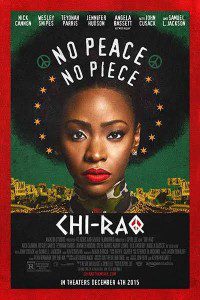(A small warning. There is lots and lots of bad language in the film, and because of that a little here, too…)
Yesterday afternoon after church and a nap, Jan and I saw Spike Lee’s Chi-Raq. I was really curious at how Mr Lee would use Aristophanes’ twenty-five hundred year old play, Lysistrata as the scaffolding for a contemporary tale of war and violence, and women stopping it by withholding sex from their combatant men. In the film “No peace, no pussy.”
We also knew that Mr Lee had royally annoyed a lot of people, starting with the mayor of Chicago. Others have complained it is exploitative, using the profound suffering of people as an entertainment, simplifying the complexities of gang culture to the point of meaninglessness. And it has come with mixed reviews. While eighty percent of Rotten Tomato’s professional reviewers spoke well of it, only sixty-three percent of its viewer respondents liked it. I am also cautioned by how many of the critics appear to be black, and possibly the majority who speak well of it appear to be white. When such things happen I try to be aware of unconscious privileges that obscure real problems.
The Rotten Tomato’s summary goes, “Chi-Raq is as urgently topical and satisfyingly ambitious as it is wildly uneven – and it contains some of Spike Lee’s smartest, sharpest, and all-around entertaining late-period work.” Sounds about right to me, with a few caveats. Todd McCarthy writes of the many themes pulled together in the movie, “black-on-black violence, gun control, bought politicians, numbness to violence, the commercial and moral gutting of neighborhoods, neglected vets and homeless and the untold other ills people live with in the shadows of a great city’s imposing downtown.” So, the movie proceeds always in danger of collapsing under the weight of its ambitions.
I was quickly pulled into the surrealistic Chi-raq where Lee’s use of rhyme for nearly all the dialog quickly became the reality of that sad and beautiful world with its bright colors, beautiful young people, devastated city-scape, and relentless violence. For me the breakout character is Samuel Jackson’s one-man Greek Chorus, Dolmedes, dressed to the nines differently in every scene, hauntingly cool, and setting up and commenting on everything with razor edged rhymes.
And I found most of the characters immediately compelling. Nick Cannon’s Demtrius Dupree, the rapper Chi-raq, and his girlfriend, Lysistrata played by Teyonah Parris are strong enough to hold the center in a complex story that threatens to spin wildly apart at any moment. And, holding the subtext of the woundedness of it all with her sustained grief, last night I dreamt of Jennifer Hudson’s Irene. Angela Bassett’s Miss Helen, John Cusack’s Father Mike Corigan (whom I later learned is patterned on a real priest, Michael Pfegler, who based on the credits appears to have a walk on, but I wouldn’t know how to recognize him.), all turned in compelling performances.
Frankly, I thought Wesley Snipes’ Cyclops was less successful, and there were a couple of scenes that just seemed off taking a biting satire into farce. Most notably the one featuring the bizarre National Guard general King Kong, portrayed by David Patrick Kelly, at least with enthusiasm, I have to admit.
For me what makes this movie not only good, but perhaps great, is how it holds up what appear to be the insurmountable difficulties of our growing underclass and the racism that allows it to be largely invisible to the majority population, it also hints at what it would take to change things. And it isn’t a sex strike, as delightful as that conceit is. Rather there’s a current at play in the film that speaks to our genuinely seeing how we are truly all connected, and the feeling life that arises as we find those connections, the experience of love. And the choices we make from that place when we find it.
I didn’t expect that message from Mr Lee. But, as someone who is deeply concerned with the way our current society seems unstoppably tumbling into a new era with a very tiny, very rich elite, a smaller group of people living well but precariously, and a very large underclass struggling with each other for very small things, this film actually brings a hint of hope.
The odds are against us, I fear.
But, Spike Lee’s movie gives me a shadow of a hope.
And, these days, that’s a good thing.
A big thumb’s up.













